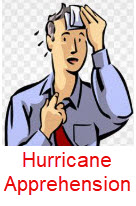Mental Survival Before a Hurricane
 |
Maybe you have experienced a hurricane first hand, or maybe you haven't. In either case, your state of mind and mental preparation leading up to the hurricane is essential to your physical survival. An individual's state of mind before the hurricane may be wrought with such things as:
|
Psychological trauma due to a hurricane may create emotional distress for people with pre-existing mental disorders, children, and others who may develop or are already beginning to display PTSD symptoms related to hurricanes or other adverse weather conditions. In addition, some psychologists believe the psychological effects of the hurricane exceed the physical effects. Indications of this psychological trauma may include but are not limited to:
- Feelings of helplessness
- Extreme sadness
- Anger or fighting with others
- Excessive use of drugs and alcohol
- Having unexplained aches and pains
- Thoughts of suicide or hurting others
Pre-existing mental health issues: People with pre-existing mental health issues may benefit from talk therapy, whether individually with a therapist or as a participant in a group. They will benefit knowing their mental health professional and prescriptions are available before, during, and after the hurricane. Help them understand there will be changes that cause long-term disruptions including potential loss of home, school, or employment. Hopefully this will help them in the recovery process.
Children's issues: In many cases, the psychological trauma due to a hurricane tends to be greater for children than for adults. Help minimize the trauma by restricting excessive viewing of the hurricane on the news and social media sites. Let them know there is a plan in place to protect them. Maintain their daily routines. Communicate with schools and child care programs to be aware of their disaster preparedness plans. Let them know you and many other individuals are there to help them recover from the hurricane.
Emergence of new psychological conditions: As hurricanes increase in frequency and greater severity, psychologists are seeing more mental disorders related to these storms. Studies seem to indicate a higher prevalence of developing mental illness among people who shelter in place and experience direct exposure to and severity of the hurricane. It may be in the best interests of all involved to flee the hurricane rather than shelter in place. Always follow the recommendations of the local, state, and federal authorities concerning the hurricane.
So, what can be done to minimize the psychological effects and emotional distress posed by the upcoming storm? Here are some ideas that may help alleviate the trauma of the upcoming hurricane:
- Have a plan to protect family and pets from the hurricane
- Don't get caught off-guard, be aware of the hurricane
- Sleep good and eat healthy
- Communicate with family and friends
- Prepare financially - insurance and cash
- Join local support groups
- Be aware of local, state, and federal support programs
Being prepared for the storm in advance will lessen your anxiety and improve your confidence in being able to weather the hurricane. Being better prepared to survive the hurricane will enable you to help others in your community. Working together, individuals in the community become more confident and less anxious, leading to a faster recovery from the hurricane.